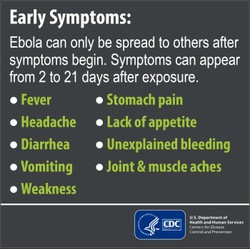The World Health Organization has declared the outbreaks of Ebola virus disease a worldwide public health emergency. Not only is there the absence of an effective available treatment or immunization, but also the tracking of case numbers and deaths from the illness is difficult to follow. Specifically, the reports of cases in some regions of Africa may not be reliable [1].
Case reports may not be correct in regions where transmission rates are quite high. The actual number of patients with this medical condition may be two to four times what the reports show. In any event, these geographic areas with high rates of transmission will require more attention than those with low occurrences of the infection [1].




 The Reality of Aspirinon 05/24/2021
The Reality of Aspirinon 05/24/2021
 An Old Microbeon 03/31/2021
An Old Microbeon 03/31/2021
 Coronavirus and Mental Illnesson 02/14/2021
Coronavirus and Mental Illnesson 02/14/2021
 Acute Ischemic Strokeon 12/25/2020
Acute Ischemic Strokeon 12/25/2020


Comments